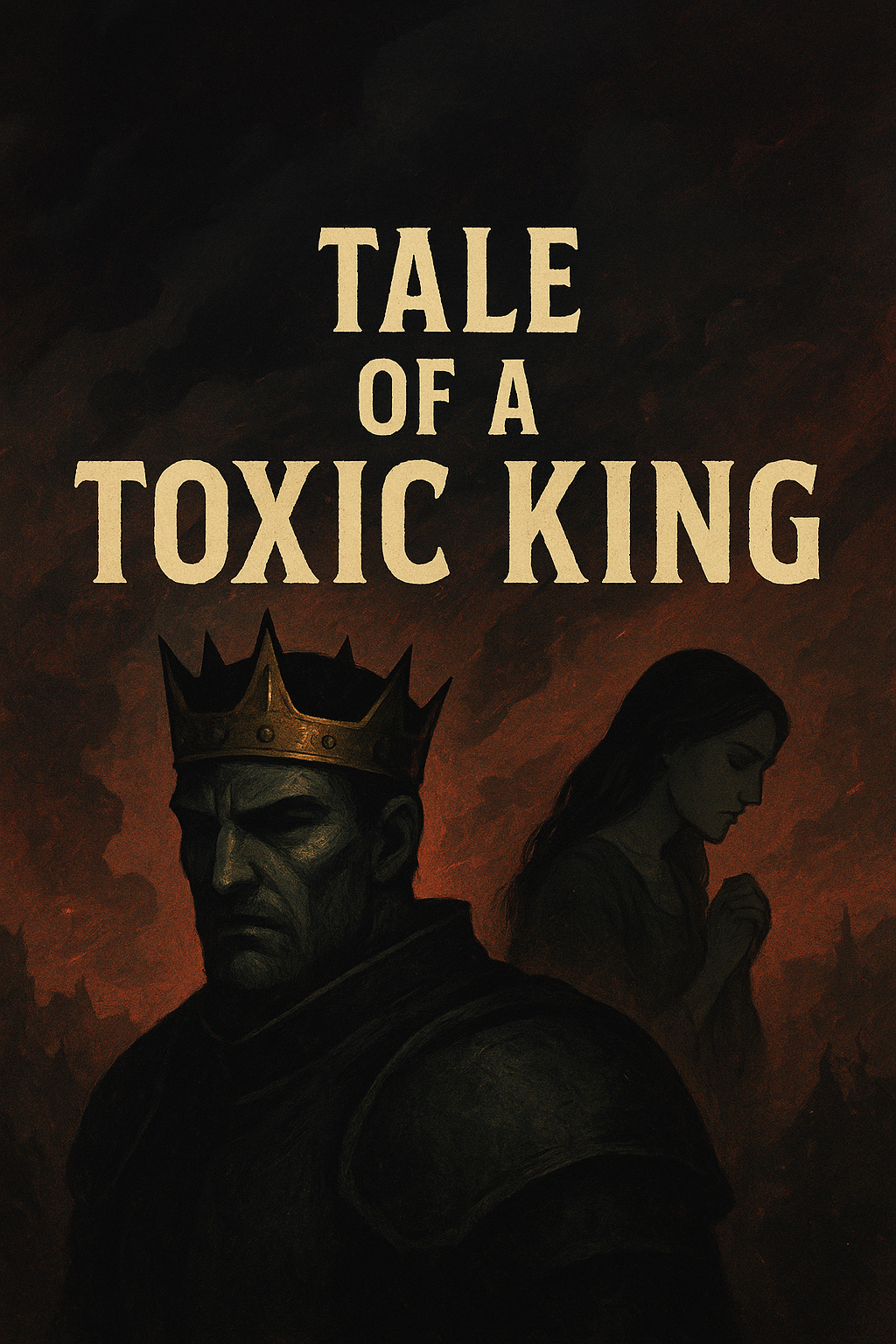TALE OF A TOXIC KING
TALE OF A TOXIC KING
When the fires first came, they were small—lanterns overturned in alleys, a child’s scream swallowed by wind. By the time the King saw them, the smoke had settled into the lungs of the city. Roofs curled like paper. Markets lay empty. At night, something moved in the corners of taverns: mouths without faces, shadows with teeth. People called them demons. The King called them an affront.
His army returned with tired eyes and empty hands. Councillors wrote long letters and offered maps and plans that sat like dust on his desk. The King read each one, spat on the floor of the council chamber, and said in a voice the men had once followed without question: “I will go. I will end this.”
It was not merely hunger for glory. It was a belief—tedious, stubborn and bright—that he alone could fix what had been broken. He had inherited the crown, the acres, the iron-backed law of the land. To his mind, leadership meant action, not argument. To his mind, asking for help was a betrayal of the throne.
So he did what kings are told to do in ballads: he girded himself in steel, strapped the old war-horses, and kissed the queen in a manner the court would whisper of for years—firm and final, like a man closing a ledger. He left before dawn, the horizon a thin bruise of purple, and did not turn back.
The Queen watched him go from the topmost tower, where the wind always tasted of the sea. She had loved him in ways small and large—by learning the weight of his favorite cup, by untying the small knot at the end of his cloak he could never undo, by setting a bowl of soup on his table when he would not eat. She believed in the King’s valour once. She knew his greed for praise. She knew, too, how easily his pride could harden into a blade that cut the soft things in his life.
At first, the kingdom he left behaved as kingdoms always do under absence: petitions arrived, fires were put out by weary hands, children were led to schoolrooms where the teacher pretended not to tremble. Miracles happen in the gap between the absent and the present—neighbors shared bread, women who had never met learned the names of one another’s children. The Queen stepped into councils in a way she had never intended and spoke in a measured voice that surprised even her.
But the nights became longer. Lamps guttered. The demons—whatever shape the villagers owed them—picked at what people had left unguarded: old grudges, debts unspoken, the soft spots of human hunger. They were not merely beasts; they were accusations, quiet and sharp. "He left us," the city whispered. “He left us to fend.”
The Queen began to mark time with small, stubborn rituals. Each morning she laid the King’s boots by the hearth as if he might return and find them. She kept a chair at the table pulled out, though no one used it. She tied a ribbon from the final night the two had danced—a thin red thing that smelled faintly of wine—to the balustrade of the tower and touched it each time the wind made the rope sing.
Days became seasons. Letters came occasionally from scouts and deserters, bearing tales: of camps where men boasted they had driven the demons into the hills; of places where corpses wore the mouths of living things; of a fire so hot it cracked the earth. Sometimes the letters spoke with raw pride of a man with a heavy sword who swung like a god. The King’s name burned through the lines. The town criers told his exploits and the children cheered. In the markets, merchants carved small wooden kings and sold them as charms.
But the Queen kept the empty chair. She kept the boots. She kept the ribbon and the bowl of soup that went cold at the table every evening.
When the reports finally came in proper, they carried the official weight of triumph. The demons had been driven back—or so the parchment read. The King’s banners flew over newly-liberated hamlets. In the great hall, the celebrants raised goblets and proclaimed their savior. Statues were debated. Songs were composed. The city exhaled relief as if it were oxygen.
And yet the Queen sat at the tower and watched the smoke dissipate. She watched the streets filling again with labor, with trade, with the fake joy of wounds forgetting their names. She watched fathers come home with their eyes like strangers. She watched her people heal, and a strange quiet settle over the house where she kept an extra place at the table.
Weeks slid into months. The King’s letters—the rare, hand-scrawled notes that had once been frequent—ceased. The carved wooden kings began to gather dust on market stalls. The townsfolk, practical as they are, accepted the victory and moved on. The Queen’s servants told themselves that the King had been stranded in a mountain pass, that he had been summoned to a distant throne, that heroism had its own terrible call. But in the small hours, when the city slept and the ribbon hissed in the wind, the Queen’s heart learned to translate absence into another word: choice.
The truth braided itself slowly. The King had wanted to prove, above all else, that he needed no counsel. He had set the rule that the sword would decide. He had refused to hear compromises that smelled like defeat. And in the dark, when the demons pressed against flesh instead of cloth, he had chosen spectacle over safety: one man at the front instead of an army that might have held the line. He had given the people a story and taken from his home steady hands.
On a winter’s dawn, a hunter came to the palace gates with a bundle wrapped in oilcloth. He did not stay for honor; he stood, rain on his shoulders, and handed the parcel to the steward. Inside were straps of armor eaten with rust and a small iron ring, bent as if hit by blows. There was no body; there was only evidence—things a man might have carried and abandoned when the sea took him or the mountains refused him.
“Your Majesty,” the steward said, “the trail ends.”
The Queen went to the window and watched the river. It cut the kingdom in two like a blade, clean and indifferent. Men crossed it on boats and on bridges they had rebuilt. Children played on its banks. The ribbon on her balustrade fluttered.
She laid the iron ring on the table next to the cold bowl. She looked at the empty chair and then at the city she had been asked to love and govern. She thought of the small good deeds that had kept the people alive in the King’s absence: women mending nets, boys carrying water, neighbors who lent roofs to strangers. She thought of the way the King's absence had widened the space for those hands to move.
The King never came back.
People will tell you stories about what that means. Some will say he died as heroes do—alone, brave, struck down by a demon with teeth of fire. Some will say he abandoned the world and started another life under foreign skies. The sellers in the market will keep selling carved kings; the balladeers will write lines about sacrifice. But in the kitchens and the lanes and the quiet rooms where people hang on to ordinary things, the story is different: he left a place that did not know how to be led without him. He left a wife who learned to carry a crown that did not sit well on her head. He left a city that had been saved and yet still bled.
When the Queen finally stood to speak in the council chamber—months later, her voice worn like a coin—she did not call for monuments. She did not beg for epithets. She said only this: “We are not saved by absence nor by the myths of single swords. We are saved by hands that stay.”
Whether that was forgiveness or indictment depended on the ear that heard it. The ribbon at the tower unthreaded itself with the passing years. The iron ring rusted and then disappeared beneath dust.
Outside, children still played by the river, inventing new monsters and daring heroes. Inside, the people mended their lives with small stitches. The King’s legend took its place among other tales—some true, some not—and the question that remained was not where he had gone, but what his leaving had cost them to learn.
And that, perhaps, is the sharpest part: that some victories are paid for in the soft places of a life, and the bill does not always say who will be the one to pay.































.jpeg)
.webp)








(0) Comment
(0) Comment